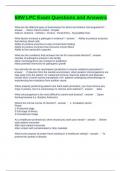Exam (elaborations)
68W LPC Exam Questions and Answers
- Module
- Institution
68W LPC Exam Questions and Answers What are the different types of transmission for direct and indirect microorganisms? Direct: Direct contact - Droplet Indirect: Airborne - Vehicles - Vectors - Portal Entry - Susceptible host. What factors increase a pathogen's virulence? Ability to pro...
[Show more]



